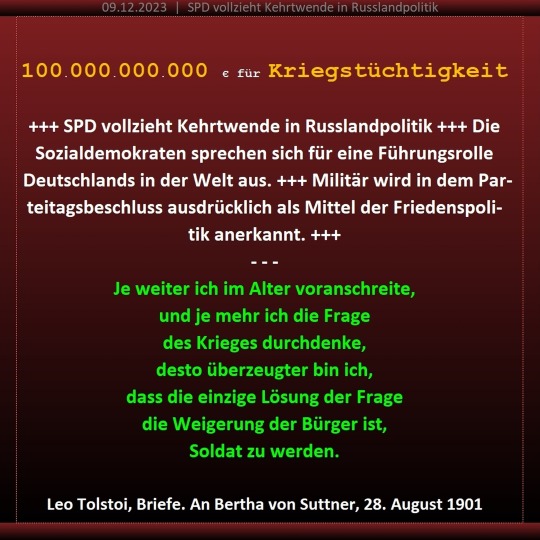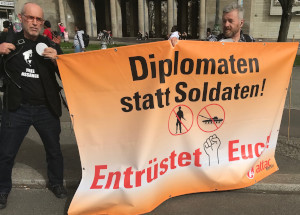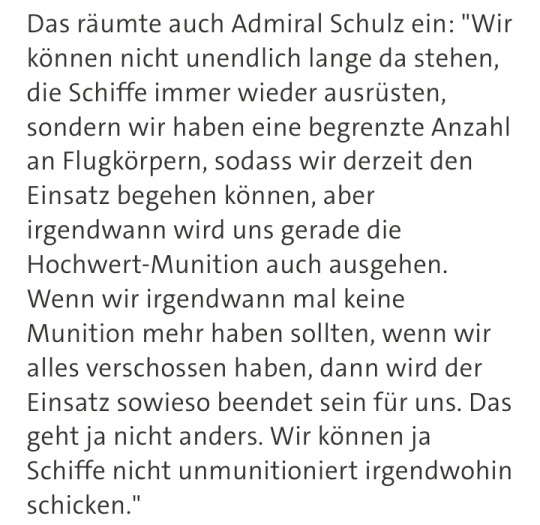#kriegstüchtig
Text

#Kriegstüchtigkeit#kriegstüchtig#Wiedereinführung#Wehrpflicht#Kasernen#Personal#Ressourcen#Wehrdienstleistende#Anforderungen#Wirtschaft
0 notes
Text
Pistorius: Deutschland soll #kriegstüchtig werden🤔🤬 Von #Kriegstüchtig ist es nicht mehr weit zu #Kriegssüchtig!

youtube
0 notes
Text
The alarm calls are coming thick and fast. War could be coming for us. One after another, military chiefs from across Europe are urging publics to get ready. Political leaders, from Britain to the Nordic countries and Baltic States, increasingly emphasize that Europeans need to be prepared for a major war with Russia.
Yet Germany continues its sleepy way along the same path as if nothing is wrong and nothing needs to change. Remarkably, German Chancellor Olaf Scholz still hasn’t said that Ukraine should win its war. Though he knows and talks about the consequences that a Russian victory in Ukraine would have for Europe, he will only say that Ukraine should not lose. That’s a big difference and it shows in Germany’s policy.
Instead of announcing bold new steps to ensure that Moscow’s triumph doesn’t become a reality, Scholz points repeatedly and complacently to the actions his government has already taken, which fall far short of what is needed. Instead of proactively organizing the rapid increase of European support, he passes the buck to the United States.
German Defense Minister Boris Pistorius has tried to shake Germany’s elite from its slumbers by asserting that society needs to be kriegstüchtig—war ready. Yet, rather than awakening to the danger and rising to the task, Germans see self-satisfaction at finger pointing at other Europeans.
Germans need to be honest with themselves—and put national and European security above partisan politics. The country needs to change course, but this will only be possible by truthfully assessing Germany and Europe’s vulnerabilities, properly linking them to the evolving situation in Ukraine and in the United States, and then acting boldly, swiftly, and decisively to genuinely address the threat we all face.
The warnings from across Europe are coming more loudly and frequently for four interconnected reasons: the way Europeans are allowing the war in Ukraine to play out, the continent’s lack of key military capabilities, uncertainty about the future of U.S. security guarantees and, crucially, how Europeans are collectively signaling their weakness instead of demonstrating resolve.
Kyiv is not yet losing the war, but it is no longer winning. Russia has long been ahead in the ammunition battle and currently outfires Ukraine by a ratio of 5 to 1 in artillery shells, making attack nearly impossible and defense difficult for Kyiv. Moreover, after a slow and bungling start, Russia is now also winning the “adaption battle” and so has begun to turn the tide of the war in its favor.
Europe is still giving Kyiv just enough to not lose (so far) rather than getting Ukrainians what they need to win. This wrongheaded approach has cost Ukraine dearly, and, now that underprovision and the impasse in the United States have made defeat a real possibility, it stands to cost Europeans, too. Defeating Russia in Ukraine would be the best way to deter the threat posed by an aggressive and hostile Moscow—especially given European states’ weaknesses in both capabilities and doctrine.
NATO’s use of precision strike weapons to defeat larger yet less sophisticated opposing forces relied on the possibility of conceding territory to give the time needed to hit multiple targets and cripple the enemy’s war machine. As Ukraine’s experience shows, it’s what happens on that territory, in that time, that is the problem. No free society could expose its people to Russia’s barbaric occupation.
NATO has therefore switched its plan to defend all of the alliance’s territory. But as Ukraine has again shown, doing so in a state-to-state conflict requires a huge amount of equipment, ammunition, and soldiers as well as key enablers like intelligence, communication, and coordination, cutting edge electronic warfare and far-reaching logistics.
European capability gaps could, most obviously, create local overmatches in front-line states. Nonetheless, Germans should feel no false sense of security from the relative physical distance. They would be drawn into any conflict there via NATO’s mutual defense guarantee, and, as Europe’s key economic power, Germany can expect to be tested by Russia’s deep strike missiles. Simply put, without heeding the current wake-up call, the Russian missiles hitting Kyiv today could well hit Munich tomorrow.
It’s true that Germany, like several other allies, has increased its defense spending, but the response to the Zeitenwende, the epochal geopolitical shift, hasn’t gone anywhere near far enough or fast enough. The 100 billion euro “special fund” only addresses the most basic capability gaps and doesn’t compensate for decades of mismanagement. Germany still needs a “quantum leap” in capabilities in order to be ready to defend itself and play its proper role in NATO.
The underlying problem is that Germany, like other large European states—except Poland—is not rearming in a way that would leave the country ready to defend itself. Former NATO assistant secretary-general Antonio Missiroli is right that “progress has been made, but if you compare what has been done so far with what probably needs to be done, we’re still talking peanuts.”
The EU broke its promise to deliver Ukraine a “million shells by March” of 2024. They will now only come by the end of this year—and would, in total, only be enough to match Russia’s current rate of fire for just over three months. As the chair of the NATO military committee put it in late 2023, Europeans need to urgently ramp up production because “the bottom of the barrel is now visible.”
This is not only a German problem, but it is also a German problem. In 2022, the Bundeswehr had approximately two days’ worth of 155 mm artillery ammunition at current Russian rates of fire—a mere 20,000 shells. This had not significantly improved by mid-2023, and Germany substantially underspent on an already low amount of planned ammunition production last year. More is planned, but this is all going far too slowly given the current and medium-term threat and is not yet guaranteed to reach the levels needed to deter or defeat a resurgent Russia.
Yet isn’t there a contradiction here? To say that because Europeans have effective deterrence, they shouldn’t have worried about escalation and thus supplied more and better weapons to Ukraine earlier—but to now say that they should worry about the Russian threat to them because of their capability gaps?
This is due to the changing situation in the United States. While at present European states can rely on the Biden administration to live up to its Article 5 responsibilities, there are increasing concerns that Donald Trump will win the presidency—which would put this guarantee in serious doubt, critically affecting European deterrence.
It would be difficult for Trump to formally withdraw from NATO, including because Congress supports the alliance. But warfighting goes through the White House, and, as Missiroli has said, there is a real danger from the U.S. commitment being “softened or made more uncertain.”
Trump could sow doubt over Article 5 with a tweet. Moreover, he has made clear that far from being able to rely on the mutual defense clause, he could even encourage Russia to attack European allies. Russian President Vladimir Putin is ruthless at exploiting uncertainty, especially when he detects weakness, yet, rather than preparing for a potential worst-case scenario, Germany is pursuing a recklessly complacent “wait and see” approach.
Germany—and Europe—thus faces a potentially perfect storm. Not only do Europeans risk rewarding and emboldening Russia by failing to defeat it in Ukraine, but they lack key capabilities and have clear vulnerabilities that remain unaddressed, at a time when the future of the security guarantee looks uncertain. But it’s not yet too late. Here are five key things that can be done to get back on the right track.
First, Europeans need to collectively—and immediately—get Ukraine what it needs to switch to “active defense.” This would allow Kyiv to hold the line in 2024 while building the capabilities and training enough troops to go on the offensive in 2025. Instead of waiting for the United States, Europeans should proactively step up. Instead of protesting they have done enough, all European allies need to find what they can send or buy to achieve this aim from wherever it is available. For Germany, this should include sending a large number of Taurus cruise missiles as soon as possible.
Germany and its European allies need to follow the lead of Canada and others in asserting the political will to find ways to legally seize Russia’s state assets frozen in European countries. Ukraine’s fight is about European security too, so it’s right that Europeans should contribute. But European taxpayers should not foot the whole bill and should make Russia pay for its own defeat.
Ukraine must receive both a clear invitation to join NATO at the Washington summit and a clear path to actual membership. For this to happen, Europeans need to show they are serious about shifting the burden for European security to ourselves. This is the best way of keeping the United States involved in European security, but it’s also the best way for Europeans to make sure they’re insured in case the U.S. commitment wavers.
Real burden-shifting requires a step change in defense production and procurement. Europe needs to close capability deficits, remove vulnerabilities—and supply Ukraine. And it has the potential to do so, if it can muster the will. In return for large, guaranteed orders for years to come, Europe’s defense industry needs to quickly expand and accelerate production. Government procurement systems need to deliver quickly or be scrapped and replaced.
Germany, the EU country with the largest population and the strongest economy, must take the lead to enable better cooperation among the EU member states for the production and procurement of weapons. Scholz could, for example, initiate an incentive fund that finances fast European investments in security.
While this rearmament should focus on making Europe a formidable foe, capable of fighting a long, high-intensity conventional war, European leaders also need to prepare their societies—by being honest with them about the danger the nations face and how they plan to address it. Europeans also need to reach credible agreement about how they arrange—or construct—extended nuclear deterrence among European NATO states to ensure that they are not exposed to nuclear blackmail.
The last step—which is easiest to achieve and has the greatest immediate impact—is for the German government to finally, clearly, and unequivocally state that Ukraine should win the war. The goal defines the means and publicly avowing Ukrainian victory would force the government to find a way to achieve it, including by taking the measures outlined above. It would also provide the clarity the public needs—and which they would rally behind.
In combination, these measures would signal Europeans’ resolve to defend themselves, their interests, and their values. There is no certainty that Russia will attack the rest of Europe in the future, even if there are signs that it might, but if it does, Europeans must be ready—and possibly in as little as two to three years’ time.
Readying Europe greatly reduces the risk of war happening at all. Deterrence works by drastically increasing the costs of aggression and reducing Moscow’s likelihood of defeating or subduing us.
There is also no tension between Europe arming itself and arming Ukraine. The logical sequencing of this bold approach would buy Ukraine time to hold out and then go on the attack, which would in turn buy the rest of Europe the time to properly rearm. And if Ukraine is well armed enough to achieve the common aim of victory, it would also remove the single largest threat Europeans would otherwise face in the near future. But for that to happen, Germany’s leaders need to wake up.
8 notes
·
View notes
Text

Mentale Kriegstüchtigkeit
Journalismus auf Abwegen
Tagtäglich arbeiten die Medien daran uns "kriegstüchtig" zu machen. Die Parole dafür hat der Generalinspekteur der Bundeswehr, General Carsten Breuer, erst wieder am letzten Freitag auf der SiKo in München verkündet: Nicht nur die Bundeswehr, sondern auch die deutsche Gesellschaft "müssen in fünf Jahren kriegstüchtig sein".
Carlo Masala, medienaffiner Professor für Internationale Politik an der Bundeswehrhochschule in München bestätigt das mit den Worten: "Kriegstüchtigkeit ist vor allem eine mentale Geschichte." (Nach zu hören ab 02:13) Telepolis fasst seine Aussage so zusammen: Wenn sich Leute über Wörter wie "kriegstüchtig" aufregen "und lieber Verteidigung sagen mögen". So sei es "noch ein langer Weg, bis eine Mehrheit der Gesellschaft auch wirklich diese Aufgabe versteht und sie unterstützt".
Propagandaschlacht hat begonnen
Telepolis berichtet dann über zwei Beispiele von "Nachrichten", die dieser Aufgabe entsprechen. So kam das ARD-Morgenmagazin letzte Woche mit dem Titel "Immer mehr Menschen wollen Reservisten werden" (Mediathek). Natürlich kann man den Menschen zum Frühstück nicht mit den Kriegsgräuel kommen, da geht es um Kameradschaft, Zusammenhalt und darum etwas Gutes zu tun. Beunruhigende kritische Nachfragen zu etwaigen Gefahren waren Fehlanzeige.
Auch der Bayerische Rundfunk berichtete kürzlich von der "Heimatfront" und den Personalnöten der Bundeswehr. In den Vordergrund werden dabei die braunen Haare der Stabsoffizierin, die sie zu einem Zopf geflochten hat und ihr dezentes Make-up zur Flecktarnuniform gestellt. Die Uniform ist natürlich brandneu und hat weder den Dreck und Staub eines Übungsplatzes noch die Waschmaschine hinter sich. Auch älteren Bürgern, sogar Ü-60, bietet die Bundeswehr als Reservist noch größere gesellschaftliche Aufgaben. Erwähnt werden natürlich auch die Sicherheit des Öffentlichen Dienstes und die geregelten Arbeitszeiten.
Da können wir uns nur Friedemann Vogel, Professor an der Universität Siegen, der Sprache, kollektives Wissen und strategische Kommunikation, anschließen, der dazu eindeutig feststellt: "Mit Journalismus hat das rein gar nichts mehr zu tun." Hier haben Journalisten ihren Berufsstand verraten und lassen sich für Propaganda benutzen.
Wir erinnern uns dunkel, wie wir vor mehr als 10 Jahren immer wieder vor Berliner Schulen gegen die Bundeswehr: 800 Einsätze in deutschen Schulen demonstriert haben, um die SchülerInnen auf die Gefährlichkeit dieses "Arbeitgebers" hinzuweisen.
Mehr dazu bei https://www.telepolis.de/features/Kriegstuechtigkeit-Die-Neuausrichtung-der-deutschen-Mentalitaet-9632468.html
Kategorie[21]: Unsere Themen in der Presse Short-Link dieser Seite: a-fsa.de/d/3z5
Link zu dieser Seite: https://www.aktion-freiheitstattangst.org/de/articles/8688-20240220-mentale-kriegstuechtigkeit.html
#MentaleKriegstüchtigkeit#Generalinspekteur#Medien#Propaganda#einseitig#Kriegsgräuel#parteiisch#geregelteArbeitszeiten#Kameradschaft#Reservisten#Personalmangel#Militär#Bundeswehr#Aufrüstung#Waffenexporte#Drohnen#Frieden#Krieg#Friedenserziehung#Menschenrechte#Zivilklauseln
4 notes
·
View notes
Text
any other german peeps here absolutely freaked out by the rising militarism in our country? like. happening parallel to all that rise of the far-right shit? are we cool?
like. its absolutely INSANE and not even subtle to announce the introduction of a veterans holiday a few weeks after the minister dude said we need to be 'kriegstüchtig'
5 notes
·
View notes
Text
Politischer Wortschatz: „kriegstüchtig“
Tichy:»Zum Wortschatz Goethes (insgesamt 93 000 Wörter, einschließlich Briefe und amtliche Schriften) gehört „kriegstüchtig“ (noch) nicht: Er verwendet zwar mit der Substantivform „Krieg-s“ 159 Wortzusammensetzungen (Kriegsabenteuer, Kriegsabgabe … Kriegsmaschine, Kriegsminister … Kriegszug, Kriegszustand), aber nicht das Adjektiv „kriegstüchtig“. Belegt ist es jedoch bereits zu seiner Zeit: In einem „Lehrbuch der Geschichte des preußischen Staates für
Der Beitrag Politischer Wortschatz: „kriegstüchtig“ erschien zuerst auf Tichys Einblick. http://dlvr.it/T65PfJ «
0 notes
Link
0 notes
Text
Boris Pistorius: Kriegstüchtig und inkompetent — RT DE
Verteidigungsminister Boris Pistorius (SPD) ist derzeit in aller Munde. Der beliebteste Politiker Deutschlands sei der richtige Mann zur richtigen Zeit am richtigen Ort, so der Tenor in vielen Medien. Doch haben all die Lobeshymnen eigentlich auch eine fachliche Grundlage?
— Weiterlesen freedert.online/meinung/203911-boris-pistorius-kriegstuechtig-und-inkompetent/
View On WordPress
0 notes
Text
Der arme Papst Johannes
Wann war das, vor Jahren
Im Mittelmeer waren die Menschen ertrunken, zu Hunderten
Der Papst klagte und klagte an
Er nahm Überlebende zu sich, beherbergte sie
Das Medienecho war groß
Beschimpft wurde - der Papst
Jetzt ist nicht-enden-wollender-Krieg
Der Papst klagt und klagt an
Er hält die weiße Fahne, er ist gegen den Krieg
Die politische Klasse empört sich - über den Papst
Um den Papst herum wird es einsam
Erinnerungen an Heinrich Böll
"Der arme Papst Johannes"
Er ist der Bruder des Franziskus
Er ist Bettler, die Leute werfen ihm Geld in den Hut
Der eine ist einsam, wie der andere es war

Bild H.B., Tageszeitung "nd", 11.3.2024, S.8
28. April 1967
Vietnam Kriegszeiten, Agent Orange und Napalm
Muhammad Ali "Cassius Clay", 25, muß auch in den Krieg
Er weigert sich, er kommt vor Gericht
Muhammad Ali: "I Ain't Got No Quarrel With Them Viet Cong"
9. März 2024
Der Papst setzt ein Zeichen in Weiß und wir liefern die Waffen
Wir führen Krieg gegen Rußland und meine Regierung beansprucht,
das in meinem Namen zu tun.
Um es deutlich zu sagen, ich bin nicht kriegstüchtig für Krieg gegen Rußland.
0 notes
Text

#Kriegstüchtigkeit#kriegstüchtig#SPD#Kehrtwende#Russlandpolitik#Sozialdemokraten#Führungsrolle#Deutschland#Welt#Militär#Parteitagsbeschluss#Mittel#Friedenspolitik#Krieg
0 notes
Text
Sowas dämliches. Hat man aus dem Kalten Krieg nix gelernt? Hat das Aufrüsten die Welt sicherer gemacht? Und selbst wenn die Russen nach Litauen marschieren: will man, dass dann Deutsche gegen Russen kämpfen? Dann kann man gleich die ganze Menschheit verabschieden… Und wenn man denkt, dass man Trump oder Putin beeinflussen kann, ist man sowieso naiv…
0 notes
Text




Kriegstüchtig - nein danke!
Ostermarsch 2024 in Berlin
Anstatt auf Diplomatie und Deeskalation zu setzen, steigen die deutschen Militärausgaben von bisher 64 auf 85 Milliarden Euro, das sind etwa tausend Euro pro Einwohner und Jahr. Das ist der größte Sprung seit dem Ende des Zweiten Weltkrieges. Wir wollen nicht den weltweit drittgrößten Rüstungsetat, der mit sozialer Verelendung in unserem Land erkauft wird.
Schluss mit Aufrüstung und Kriegsgeschrei!
Deutsche Truppenkontingente stehen wieder an Russlands Grenze in den baltischen Staaten. Große Kriegsmanöver auf deutschem Boden sind zur Zeit in vollem Gang. Deutschland will weiterhin an der nuklearen Teilhabe festhalten, ein Nachdenken über den deutschen Finger am Knopf der Atombombe ist scheinbar kein Tabu mehr, wenn man deutsche Politiker reden hört. Denn, wie die FAZ titelt, übt die NATO bereits den Atomkrieg.
Wir wollen Frieden!
Das wollten mehrere tausend Berlinerinnen und Berliner und auch wir von Aktion Freiheit statt Angst nicht. Bei schönstem Frühsommer-Wetter ging vom KOSMOS Kino in der Karl Marx Allee durch Friedrichshain.
Zuvor - und auch nach der Demo - gab es beeindruckende Reden, u.a. von
Dr. Michael von der Schulenburg (Diplomat, ehem. Assistant General Secretary des UN Generalsekretärs),
Lühr Henken, Bundesausschuss Friedensratschlag,
einer Gewerkschaftsvertreterin aus dem Gesundheitswesen
...
Sobald die Reden schriftlich vorliegen, werden wir sie hier verlinken. Dafür verfügen wir aber schon über ein paar Bilder von der erfolgreichen Aktion.
Das Motto der Demo am Lautsprecherwagen
Die Auftaktveranstaltung
Gewerkschaftsgruppen von IGM und GEW waren dabei.
Aufstellung zum start der Demo
"Krieg" und "tüchtig" sind Worte, die nie zusammen gehören dürfen.
Wer hat die Diplomatie seit 2 Jahren auf Eis gelegt?
Die Forderungen: Ja zum Frieden! Ja zur Abrüstung! Ja zur Diplomatie! Ja zum Ausbau des Sozialstaates!
Mehr dazu bei http://frikoberlin.de
und https://www.friedenskooperative.de/ostermarsch-2024/zeitungsanzeige
Kategorie[25]: Schule ohne Militär Short-Link dieser Seite: a-fsa.de/d/3zN
Link zu dieser Seite: https://www.aktion-freiheitstattangst.org/de/articles/8730-20240331-kriegstuechtig-nein-danke.html
#Ostermarsch#Berlin#Ukraine#Russland#Israel#Palästina#Atomwaffen#Militär#Bundeswehr#Aufrüstung#Waffenexporte#Drohnen#Frieden#Krieg#Friedenserziehung#Menschenrechte#Zivilklauseln
1 note
·
View note
Link
#AlexandervonBismarck#Argentinien#BorisPistorius#BRICS#DieGrünen#Gaza#Israel#Krieg#Kriegsverbrechen#Niederlande#OmidNouripour#Palästina#Realpolitik#Wahlen
0 notes
Text
Deutsche Streitkräfte: Deutsche Streitkräfte Was es braucht, um die Bundeswehr „kriegstüchtig“ zu machen
Die JF schreibt: »Seit rund zwei Jahren dreht sich die sicherheitspolitische Debatte darum, wie die Bundeswehr wieder fit wird. Dabei fallen pragmatische Erwägungen häufig unter den Tisch. Denn mit ein paar neuen Panzern ist nichts getan. Eine Analyse von Ferdinand Vogel.
Dieser Beitrag Deutsche Streitkräfte Was es braucht, um die Bundeswehr „kriegstüchtig“ zu machen wurde veröffentlich auf JUNGE FREIHEIT. http://dlvr.it/T60Fbg «
0 notes
